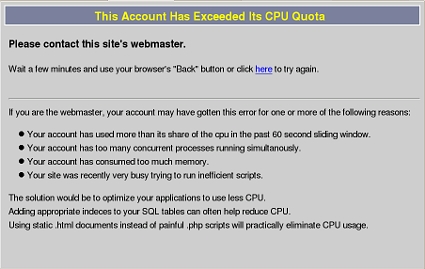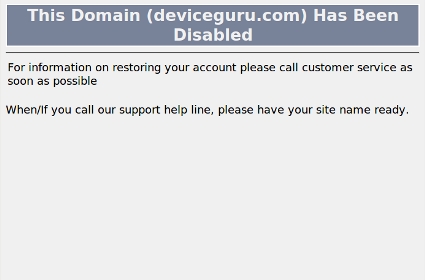Nightmare on HostMonster Street
Last updated Feb 16, 2009 — 1330 views Visitors to DeviceGuru over the past week may have noticed an ugly page announcing to the world that “This Account has Exceeded Its CPU Quota,” instead of the desired content.
Visitors to DeviceGuru over the past week may have noticed an ugly page announcing to the world that “This Account has Exceeded Its CPU Quota,” instead of the desired content.
Unfortunately, our webhosting provider has a nasty policy of pulling the plug — without so much as a warning — on sites that exceed an arbitrary and undefined CPU resource utilization cap.
It all started when DeviceGuru’s recent blog post, “The Boxee Box Cookbook,” attracted loads of attention at Slashdot, LifeHacker, and elsewhere around the blogosphere.
Now DeviceGuru is no stranger to traffic surges from Slashdot and Digg, having been featured on those sites over 20 times in the past year. So, expecting the &%@# to hit the fan on our Boxee Box story, we hastened to activate Elliott Back’s trusty “Digg Defender” WordPress plugin, which normally does a great job of protecting the server we reside on from high loading, by deflecting traffic to the CoralCDN content caching network.
This time, however, rerouting traffic to CoralCDN wasn’t sufficient. On the day The Boxee Box Cookbook was published — despite promises of “unlimited site bandwidth” by HostMonster, our webhosting service provider — visitors were greeted with this lovely page:
Move along folks, nothing to see here!
(Click image to enlarge)
Even after working hard to reduce the traffic on the site, we discovered the next morning that this ugly gray-and-white page was occupying DeviceGuru.com’s place on the Web:
Uh-oh, we’re in big trouble!
At this point, we couldn’t even login to the site’s web-based control panel or SSH into the server to try to remedy the situation.
Keep in mind that up to this point, HostMonster had never even emailed DeviceGuru about the problem or what they were about to do — they simply arbitrarily shut us down!
 The moral of the story? Be suspicious of sites that entice webmasters and bloggers with promises of “unlimited site bandwidth.”
The moral of the story? Be suspicious of sites that entice webmasters and bloggers with promises of “unlimited site bandwidth.”
Ask how they plan to deliver on those promises, review the fine print in their terms of service, and try to determine how you’ll know where your site stands relative to the limits of their “unlimited bandwidth.”
You might, for example, ask: “How much is too much, and how can I know where my site stands relative to your limits?” When I asked that today (when I called to cancel their webhosting service), I was referred to the illuminating answer buried in the fine print of the company’s terms of service.
There, I learned that…
“HostMonster.Com does not set an arbitrary limit or cap on the amount of resources a single Subscriber can use…”
Yet, the company…
“reserves the right to limit processor time, bandwidth, or processes in cases where it is necessary to prevent negatively impacting other Subscribers.”
In other words the company “reserves the right to limit” the bandwidth of a website to whatever it decides is appropriate, based on current loading conditions, and can periodically disable the site — without warning — to enforce those limits. So much for “unlimited.”
Here’s DeviceGuru’s advice to HostMonster:
- Provide automated email warnings when levels are getting high, so site owners become aware that their sites are nearing the arbitrary and undefined trip point; better yet, provide a tachometer-like tool that site owners can use to monitor their CPU bandwidth levels, so they can see where they stand and make adjustments as needed
- Notify site owners via automated emails when their sites actually hit the trip-point, so they are immediately aware that their site is temporarily disabled; ditto for the more serious site suspension
- Allow sites to designate a custom page that could be used in case a trip point is crossed, as a substitute for the ugly default ones used now
- Devise a variable “throttling” function that maintains sites within their CPU bandwidth limits (there could be a trip-point at which this throttling kicks in); this could asymptotically degrade a site’s response time according to how much of its server’s CPU bandwidth it occupies, thus ensuring that its quota isn’t exceeded without having to completely shut the site down
In contrast to HostMonster’s “unlimited-but-limited” bandwidth policies, Hurricane Electric — DeviceGuru’s new home — uses a well-defined formula to calculate each site’s monthly bandwidth, provides continually updated data on how much bandwidth the site has used each month, and offers a means to pay for additional traffic when the need arises. All that for as little as $9.95 per month.
I like that much better than HostMonster’s intellectually dishonest offer of “Unlimited Site Bandwidth.”
I suppose a good rule of thumb might be: never do business with a company that has “monster” in its name 😉




I had EXACTLY the same problem 2.5 weeks ago, despite Coral being enabled (I learned this tip from you). It ruined part of my weekend and turned away readers.
I am about subscribe hostmonster’s service as I read somewhere they are one of the best at very reasonable price…………now see other’s problems with hostmonster and yours..sounds like I need tosearch else where
I was also with Hostmonster for 1.5 years same website same daily traffic of 300 visitors per day and suddenly in 2009 Jan they suspended my site and disabled control panel.
They just said my scirpt is using to much CPU and I need to fixit or go somewhere else..
They should really HIGHLIGHT WELL this CPU limitation in their TOS
Not worth it I just moved to where I did not find limitations and they have a great control panel. I heard they will not have 99.99% uptime. But 99% and no suspension seems worth it..
USED a promo code to get 50usd off using promo: GIVE50GIFT so only paid 69bucks for a year
just move to dreamhost and USED a promo code to get 50usd off using promo: GIVE50GIFT so only paid 69bucks for a year